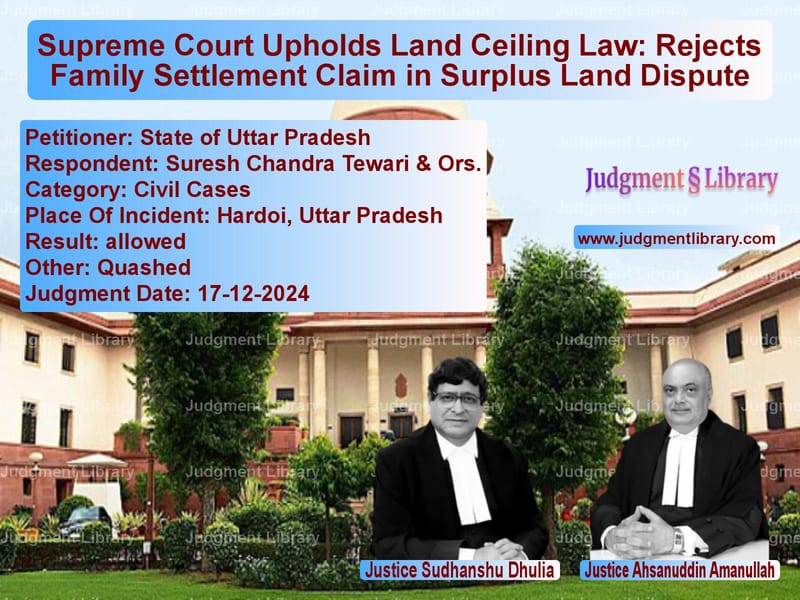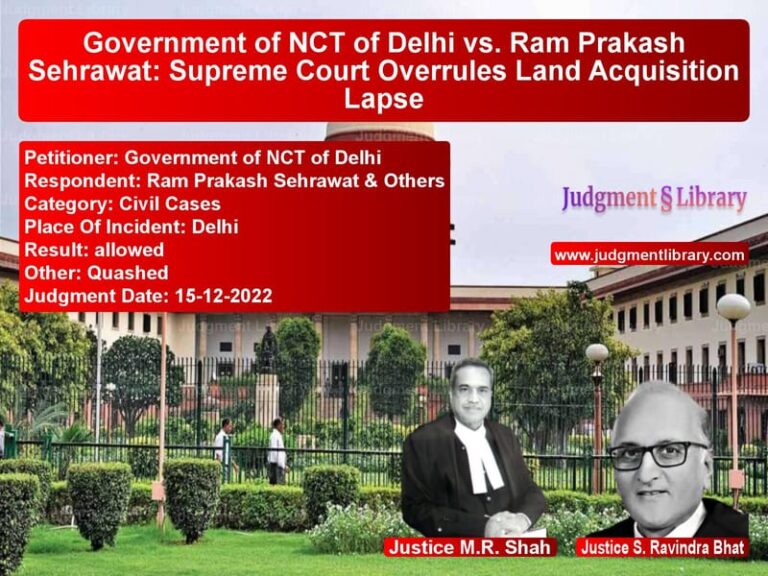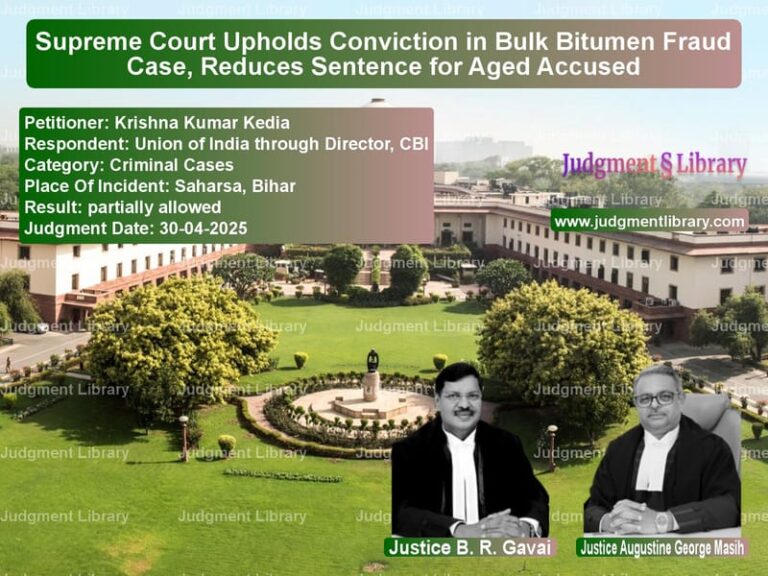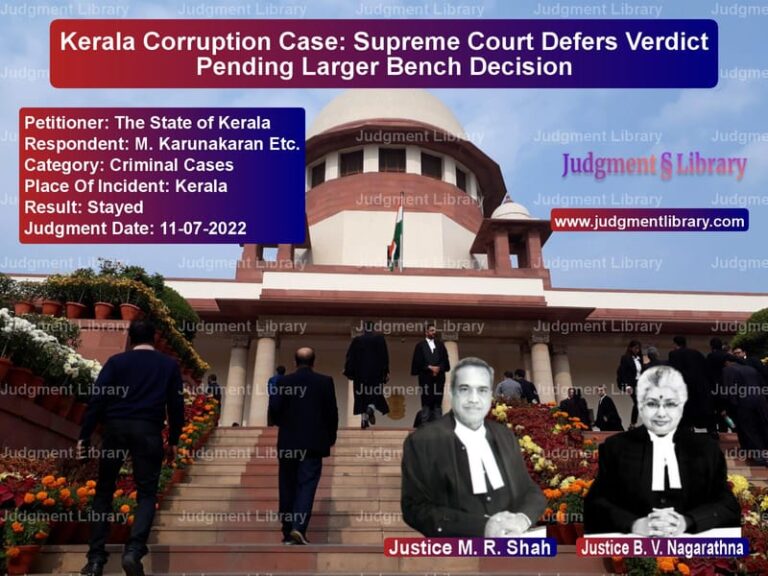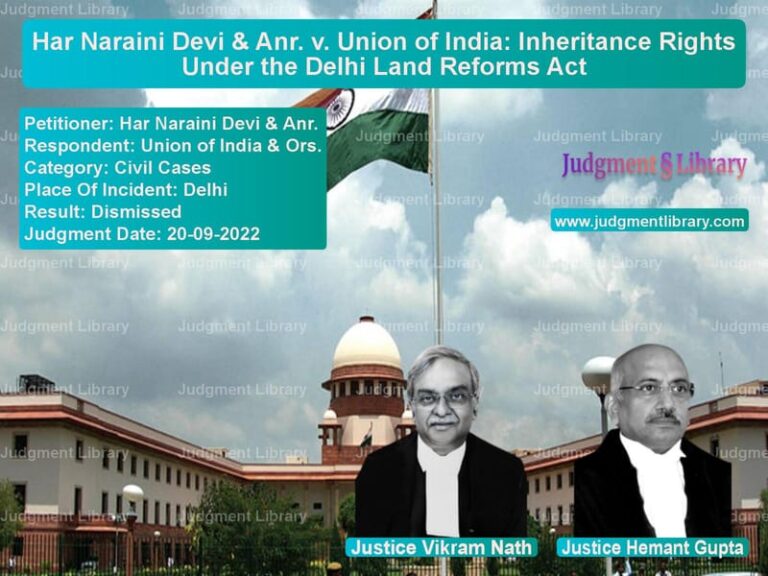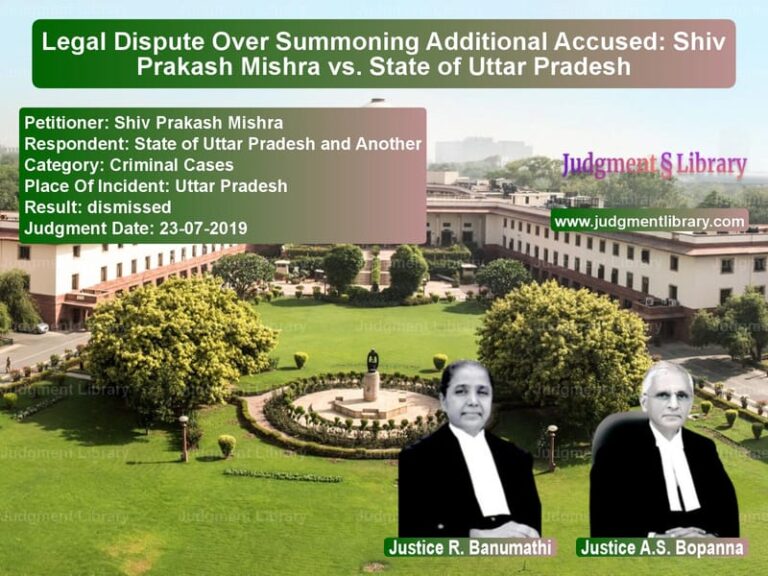Supreme Court Upholds Land Ceiling Law: Rejects Family Settlement Claim in Surplus Land Dispute
The Supreme Court of India has upheld the principles of land ceiling laws in the case of State of Uttar Pradesh vs. Suresh Chandra Tewari & Ors., ruling that a family settlement cannot be used to evade land ceiling regulations. The Court set aside the Allahabad High Court’s decision and directed the District Magistrate of Hardoi to take possession of surplus land and distribute it to the landless.
Background of the Case
The dispute arose under the Uttar Pradesh Imposition of Ceiling on Land Holdings Act, 1960 (“Act of 1960”), which was enacted to redistribute land from large landowners to landless farmers. The case revolved around whether a private family settlement executed after the cut-off date could be used to bypass land ceiling limits.
The key events were as follows:
- 1974: The Prescribed Authority issued a notice to Hari Shankar Tiwari, the father of the respondent, asking why his excess land should not be declared surplus.
- 1975: A District Judge reduced the declared surplus land but upheld the decision to seize excess land.
- 1978: The Allahabad High Court dismissed a writ petition challenging the surplus land declaration.
- 1981: The respondent, son of the original landholder, filed a fresh objection claiming that a family settlement in 1969 had already divided the land among family members.
- 1985: The Prescribed Authority accepted the claim, reversing the earlier surplus land declaration.
- 1994: The Additional Commissioner (Judicial) overturned the 1985 order, reaffirming that the family settlement was not valid.
- 2022: The Allahabad High Court ruled in favor of the respondents, leading to an appeal before the Supreme Court.
Supreme Court’s Examination
The Supreme Court, led by Justices Sudhanshu Dhulia and Ahsanuddin Amanullah, examined the validity of the respondents’ claims and the High Court’s ruling.
1. Can a Family Settlement Override Land Ceiling Laws?
The Court ruled that under Section 5(7) of the Act of 1960, any partition executed after January 24, 1971 must be ignored for land ceiling calculations. Since the respondent’s family settlement was made in 1969 but formalized through a suit in 1971, it was ineligible.
“Once the entire objection regarding the family settlement was rejected by all authorities, including the High Court, there was no occasion for starting a fresh round of litigation.”
2. Was the Fresh Objection an Abuse of Law?
The Supreme Court criticized the respondents for repeatedly challenging settled findings, calling it an “abuse of process.” The Court noted that the Prescribed Authority’s 1985 order favoring the respondents was improper.
“The entire mischief has been done by the Prescribed Authority in this matter, who should not have interfered.”
3. What is the Role of the District Magistrate?
The Court directed the District Magistrate of Hardoi to immediately take possession of the surplus land and redistribute it to the landless farmers.
Final Judgment
The Supreme Court ruled:
- The Allahabad High Court’s order of 2022 was set aside.
- The State’s appeal was allowed.
- The surplus land declaration was reinstated.
- The District Magistrate of Hardoi was directed to take possession of the land and distribute it.
Implications of the Judgment
This ruling has significant implications for land reform laws and property disputes in India:
1. Strengthening Land Ceiling Laws
The Court reaffirmed that land ceiling laws are meant to prevent large landowners from hoarding excess land through legal loopholes.
2. Preventing Abuse of Judicial Process
The decision prevents powerful landowners from filing repetitive cases to delay land redistribution.
3. Protecting Rights of the Landless
The Court ensured that surplus land is distributed to the landless as intended by the law.
Conclusion
The Supreme Court’s ruling in State of Uttar Pradesh vs. Suresh Chandra Tewari is a landmark decision that reinforces land reform laws in India. By rejecting the respondents’ attempts to misuse family settlements, the Court upheld the core objective of equitable land distribution. The ruling ensures that land ceiling laws cannot be circumvented through repeated litigation, securing justice for landless farmers.
Petitioner Name: State of Uttar Pradesh.Respondent Name: Suresh Chandra Tewari & Ors..Judgment By: Justice Sudhanshu Dhulia, Justice Ahsanuddin Amanullah.Place Of Incident: Hardoi, Uttar Pradesh.Judgment Date: 17-12-2024.
Don’t miss out on the full details! Download the complete judgment in PDF format below and gain valuable insights instantly!
Download Judgment: state-of-uttar-prade-vs-suresh-chandra-tewar-supreme-court-of-india-judgment-dated-17-12-2024.pdf
Directly Download Judgment: Directly download this Judgment
See all petitions in Property Disputes
See all petitions in Landlord-Tenant Disputes
See all petitions in Succession and Wills
See all petitions in Judgment by Sudhanshu Dhulia
See all petitions in Judgment by Ahsanuddin Amanullah
See all petitions in allowed
See all petitions in Quashed
See all petitions in supreme court of India judgments December 2024
See all petitions in 2024 judgments
See all posts in Civil Cases Category
See all allowed petitions in Civil Cases Category
See all Dismissed petitions in Civil Cases Category
See all partially allowed petitions in Civil Cases Category

